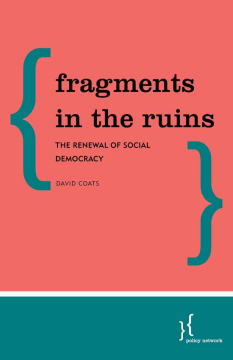
Additional Information
Book Details
Abstract
Mainstream social democrats have struggled to hold this own since the global financial crisis. Some established parties have been swept off the political stage while others have seen catastrophic falls in their vote shares. Writing from a distinctively British perspective, David Coats looks to pinpoint the reasons for this decline and offer an optimistic outlook, arguing that social democracy still represents the best hope for affluent societies to secure the values of the Enlightenment. He also makes the case that the Labour party is most successful when it is open pluralist and disengaged from arid internal wrangling. Rather than offering a comprehensive policy agenda, the author calls for a discussion engaging all legitimate strains in the social democratic tradition, outlining a series of questions that Labour must answer if it is to secure a general election victory.
David Coats is the director of WorkMatters Consulting. He has been a research fellow at the Smith Institute since 2010 and in 2014 was appointed as a visiting professor at the Centre for Sustainable Work and Employment Futures, University of Leicester.
From 2004-10 he was associate director – policy at The Work Foundation. From 1999-2004 he was head of the Trades Union Congress’ economic and social affairs department, having first joined the TUC in 1989 as an employment law specialist.
He has been a member of the Labour party for 36 years.
Table of Contents
| Section Title | Page | Action | Price |
|---|---|---|---|
| Cover | i | ||
| FRAGMENTS IN THE RUINS | ii | ||
| FRAGMENTS IN THE RUINS: The Renewal of Social Democracy | iv | ||
| Copyright | v | ||
| CONTENTS | viii | ||
| ABOUT THE AUTHOR | x | ||
| FOREWORD | xii | ||
| THE WORLD TURNED UPSIDE DOWN | 1 | ||
| TWO SONGS | 1 | ||
| THE GLOBAL FINANCIAL CRISIS AS AN EXPLANATION? | 3 | ||
| CAPITALISM: INCONVENIENTTRUTHS FOR RIGHT AND LEFT | 4 | ||
| CIVILISING CAPITALISM: THE SYMBIOSISOF PUBLIC AND PRIVATE | 8 | ||
| THE POSTWAR SETTLEMENT 1945–1980 | 10 | ||
| DID THATCHERISM DELIVER ITS PROMISE? | 12 | ||
| NEW LABOUR IN POWER 1997–2010 | 14 | ||
| POPULISM, THE CRISIS ANDCREATIVE DESTRUCTION | 16 | ||
| VARIETIES OF CAPITALISM,GLOBALISATION AND IMMIGRATION | 17 | ||
| WHAT IS LABOUR FOR? | 29 | ||
| THE POWER OF NOSTALGIA | 29 | ||
| LABOUR’S DIVERSE IDEOLOGICAL TRADITIONS | 31 | ||
| ETHICS AND VALUES: THEIMPORTANCE OF EQUALITY | 33 | ||
| LABOUR’S DOCTRINAL DISPUTES | 49 | ||
| POSSIBILITIES FOR THE FUTURE | 53 | ||
| THE CASE FOR REVISIONISM:TOWARDS A NEW SYNTHESIS | 64 | ||
| LABOUR AS THE PARTY OFAND WORKERS | 69 | ||
| WORK: MISSING FROM THE LEFT’S NARRATIVE? | 69 | ||
| LABOUR’S PROBLEM | 71 | ||
| A BOLD VISION OF ‘GOOD WORK’ | 73 | ||
| LABOUR MARKET REALITIES | 75 | ||
| SO WHY ARE PEOPLE ANGRY? | 91 | ||
| AN OUTLINE POLICY AGENDA | 95 | ||
| QUESTIONS FOR THE LEFT | 107 | ||
| OPTIMISM; A RECIPE FOR SUCCESS? | 107 | ||
| CLIMATE CHANGE | 109 | ||
| IT’S THE ECONOMY, STUPID | 111 | ||
| DEMOGRAPHICS: THE AGEINGPOPULATION AND IMMIGRATION | 120 | ||
| INEQUALITY, REDISTRIBUTIONAND THE WELFARE STATE | 123 | ||
| THE STATE AS PROVIDER OR FUNDER OFCITIZENSHIP GOODS: THE LIMITS OF MARKETS | 128 | ||
| THE CAPACITY OF THE STATE AND ANEW CONSTITUTIONAL SETTLEMENT? | 136 | ||
| THE CHALLENGE TO DEMOCRACY | 145 | ||
| NOTES | 151 |
